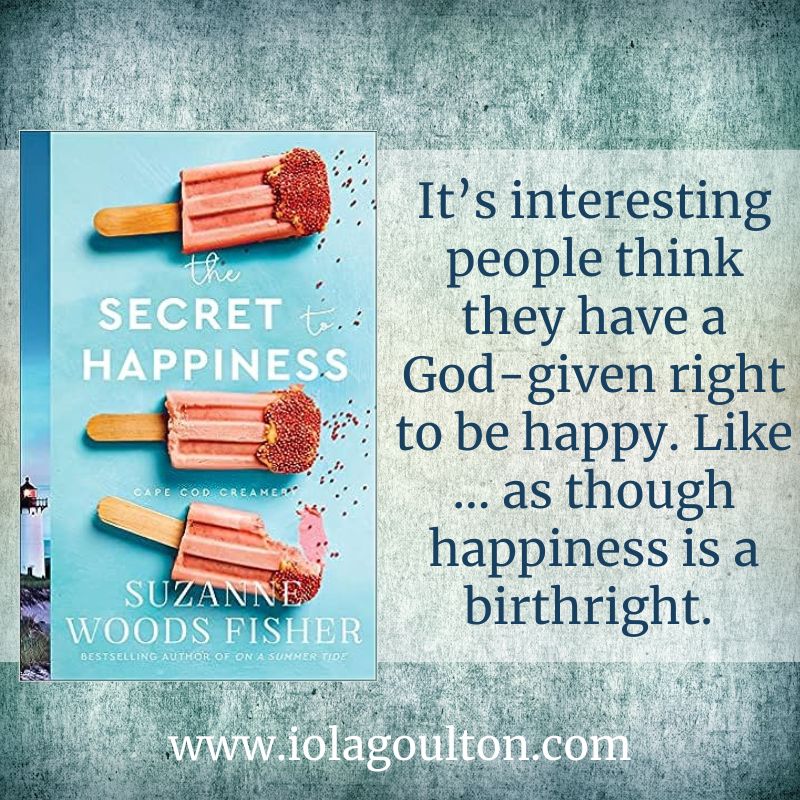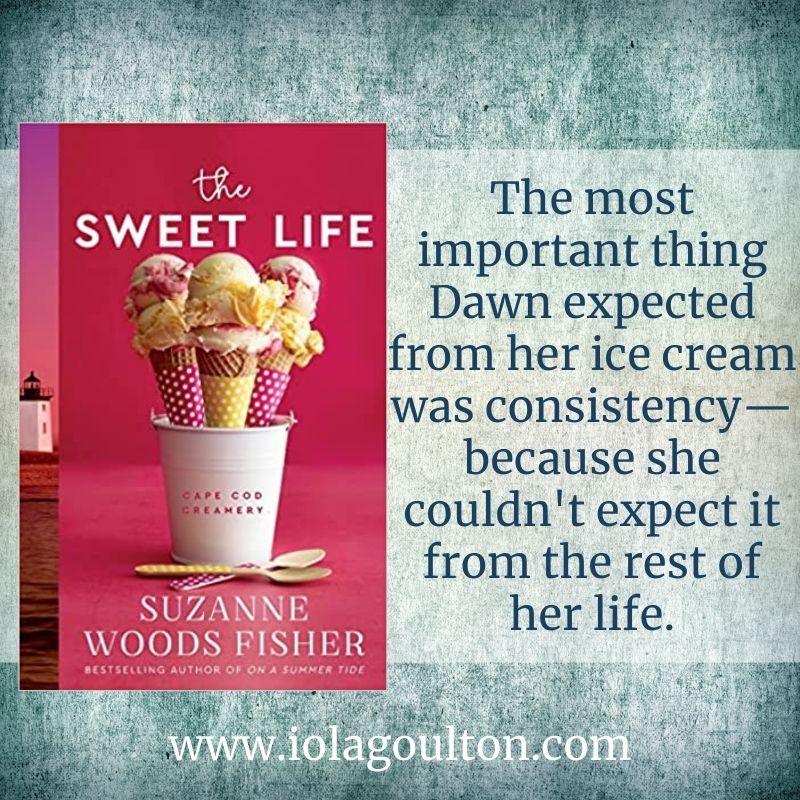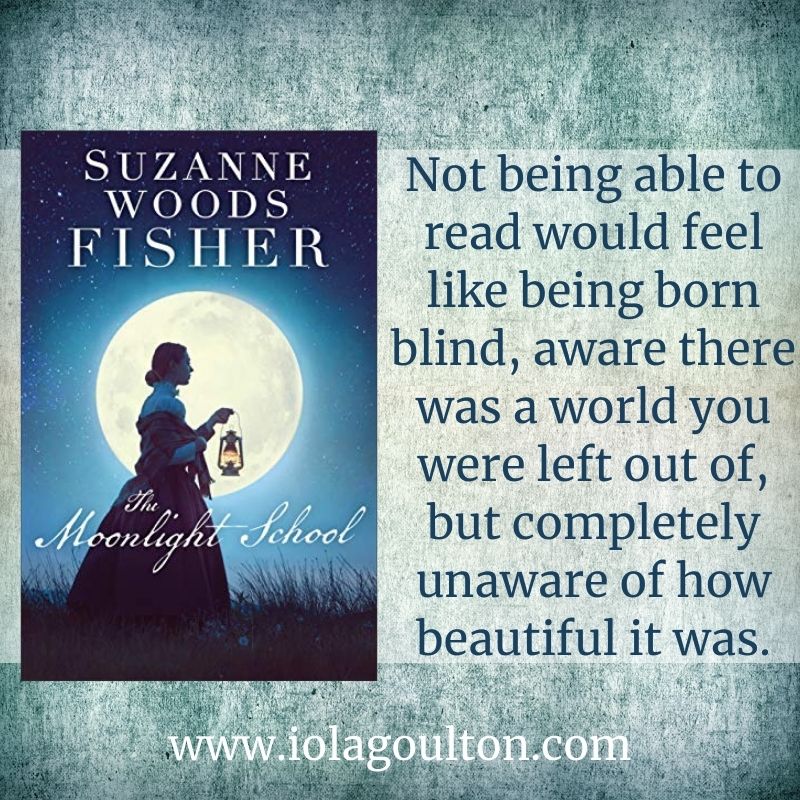The Secret to Happiness is the sequel to The Sweet Life, which brought mother and daughter duo Marnie and Dawn to the seaside town of Chatham, where they own and run the Main Street Creamery. I had mixed feelings about The Sweet Life—the cover had led me to expect a romance, but it was more women’s fiction, and while I liked Marnie, I wasn’t so sure about Dawn.
I have some of the same mixed feelings about The Secret to Happiness.
It started with a Cast of Characters list, which I rarely find to be a good sign in contemporary fiction. It’s fine in historical fiction, where it can be important to know which characters are real historical people and which are products of the author’s imagination. In contemporary fiction, I find it’s often an excuse for the author to dump a bunch of characters on the reader without proper introduction. It’s not—Fisher does a great job with bringing each new character into the story—so I don’t know why the Cast of Characters was included.
While both Marnie and Dawn are point of view characters in The Secret to Happiness, this is Callie Dixon’s story.
Callie is Marnie’s niece and Dawn’s cousin, and she is currently unemployed after giving two hundred people food poisoning (oops). Two hundred people attending the annual Food Safety Conference (big oops). Callie has always been an overachieving perfectionist–she had to be, to be offered a role as executive chef in a top Boston hotel while still in her twenties. But she’s changed, and now she barely leaves her bed, which spurs Dawn into forcing her to attend a free class at the local community centre: The Secret to Happiness.
The class is taught by a local author and college professor, and while Callie is convinced she is happy and not depressed, she does find the class interesting. It’s pretty obvious Callie is depressed, so my biggest bugbear is that Dawn’s solution to Callie’s mental health issues was a free community centre class, not professional medical attention.
Mind you, that did fit with Dawn’s character.
Dawn is single-minded in her focus to the point of being self-centered, and she’s not great at seeing or considering other points of view. I also did not appreciate her “revelation” that moving to a (fictional) seaside town was the cure that “changed her life”. I live in a town by the sea, and people here need Jesus as much as anyone. From a secular point of view, Dawn’s advice is an irresponsible diagnosis. From a Christian point of view, it negates the need for Jesus.
But I like Callie’s character. It’s good to see a character who is struggling, and it’s good to see her come out the other side (even if I did question Dawn’s methods). And I loved Leo the Cowboy, the six-year-old who has made the ice cream store his second home (Leo was my favourite character in The Sweet Life.)
Despite my initial negative feelings about Callie’s diagnosis and treatment, the story did offer some good advice on happiness.
As such, I much preferred the second half of the novel to the first (perhaps because I guessed a major plot twist around halfway thought, so was waiting to see how and when the reveal would come).
The Secret to Happiness is women’s fiction rather than romance. I expect women’s fiction to tackle some tough issues—which it did. I also expect those tough issues to be dealt with in a mature and responsible way—which I’m not convinced it did.
I did enjoy the story overall but would have enjoyed it more if the mental health issues (which were central to the plot) had been treated a little more seriously i.e. with professional help. After all, if someone thought they had a broken arm, we’d suggest they go to a clinic, get an ex-ray, and have an expert decide if they need treatment. Why wouldn’t we do the same if we suspect someone has a mental health problem?
Thanks to Revell Books and NetGalley for providing a free ebook for review.
As it happens…
I’d just finished scheduling this review when I received an email from Christian author Ginny Yttrup talking about her experiences with depression … which read as very similar to Callie’s experience. Ginny says:
When prescribed by a knowledgeable physician or psychiatrist, medications have helped many, many others who fight depression. If you struggle, please don’t allow stigmas and shame to keep you from seeking help.
I have found therapy with Christian counselors very helpful. I’ve learned techniques I can apply when the darkness looms. I’ve also found nutrition counseling very helpful. My moment-by-moment relationship with Jesus is most helpful, reminding me there is more. . . . More than myself, more than what I feel in this moment, more than what I attempt to control. There is the Spirit’s strength through my weakness. There is hope.
If you’re struggling with depression or other forms of mental illness, there are people who want to help, who are trained to help. Please reach out for help.
The American Association of Christian Counselors can help you find a counselor in your area. Search their database here.
Or visit the Suicide and Crisis Lifeline.
You can follow Ginny Yttrup at her website or on Substack.
About Suzanne Woods Fisher
 Suzanne Woods Fisher is an award-winning, bestselling author of more than 30 books, including On a Summer Tide and On a Coastal Breeze, as well as the Nantucket Legacy, Amish Beginnings, The Bishop’s Family, The Deacon’s Family, and The Inn at Eagle Hill series, among other novels. She is also the author of several nonfiction books about the Amish, including Amish Peace and Amish Proverbs.
Suzanne Woods Fisher is an award-winning, bestselling author of more than 30 books, including On a Summer Tide and On a Coastal Breeze, as well as the Nantucket Legacy, Amish Beginnings, The Bishop’s Family, The Deacon’s Family, and The Inn at Eagle Hill series, among other novels. She is also the author of several nonfiction books about the Amish, including Amish Peace and Amish Proverbs.
Find Suzanne Woods Fisher online at:
Website | Facebook | Instagram | Pinterest | Twitter
About The Secret to Happiness
Escape to Cape Cod–where you just might find the secret to happiness
Callie Dixon had the world by the tail . . . until it all slipped away. Fired from her dream job after making a colossal mistake, she’s escaped to her aunt’s home on Cape Cod for time to bounce back. Except it isn’t a home, it’s an ice cream shop. And time isn’t going to help, because Callie’s bounce has up and left. There’s a reason she made that mistake at work, and she’s struggling to come to terms with it.
Things go from bad to worse when Callie’s cousin Dawn drags her to a community class about the secret to happiness. Happiness is the last thing Callie wants to think about right now, but instructor Bruno Bianco–a curiously gloomy fellow–is relentless. He has a way of turning Callie’s thoughts upside down. Her feelings, too.
Bruno insists that hitting rock bottom is the very best place to be. But if that’s true, how is it supposed to help her figure out what–or who–has been missing from her life all along?
Find The Secret to Happiness online at:
Amazon | BookBub | ChristianBook | Goodreads | Koorong







